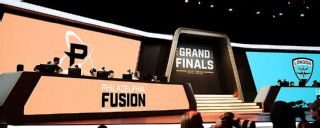|
When the New York Excelsior was still favored to appear in the Overwatch League Season 1 finals in New York, the London Spitfire was asked in its semifinals postmatch news conference how it would feel to face an opponent with such a hostile crowd. The team's response was simple. Having already dispatched both Los Angeles teams en route to the grand finals stage, the Spitfire was used to playing against the crowd in Burbank. While the sold-out Barclays Center's capacity crowd was significantly larger than the 450-seat Blizzard Arena (and the decibel levels infinitely higher), the Spitfire didn't seem to take issue with the predominantly Philadelphia Fusion-favored crowd. Instead, the team thrived, thanks to the flexibility of its players. Everything the Spitfire does begins with DPS flex player Park "Profit" Joon-yeong. In the Spitfire's playoff matches leading up to the grand finals, Profit played 10 different DPS heroes. When he flexes onto a different DPS hero, his teammates adjust around him, coordinating their attack. "Right now, what the coaches have done is focus on Profit, having him learn all of the heroes, and he'll be switching a lot," support player Kim "NUS" Jong-seok said before the final. "When you have that one flex DPS player it's easy to build off of that onto other guys, so 'if he does this, you do this,' and that's been our strategy and it's become a part of our playstyle." This was no different in the Spitfire's first match against the Fusion, with Profit flexing onto one of his old favorites in Genji and additionally pulling out Mei for a strong Volskaya Point B defense that halted the Fusion's attack. Profit also was the one who clinched Volskaya for the Spitfire with a strong Tracer performance on London's Point B attack. The Fusion is a team that likes to attack first with players that feed off of each others' energy and momentum. Yet, the Spitfire stopped the Fusion's momentum several times, thanks to Profit and flexible picks from the entire Spitfire team. When the Fusion sat flex support Isaac "Boombox" Charles in favor of keeping Choi "HOTBA" Hong-joon and adding in Gael "Poko" Gouzerch, the Spitfire was able to answer with Choi "Bdosin" Seung-tae, who won the Tracer battle with HOTBA. Going into this series, Bdosin had already played 11 different heroes, only four of which were traditional supports. This worked in the Spitfire's favor, especially when the team was able to swap Bdosin back onto the Zenyatta, putting the Fusion at a disadvantage given its lineup of flex tank and DPS players, rather than having a flex support. Not to be outdone by their teammates, London's tank line of Kim "Fury" Joon-ho and Hong "Gesture" Jae-hee were the true difference-makers in today's match, continuing the superior play they've had throughout the Spitfire's entire playoff run. Fury and Gesture don't change their hero pools as often as their teammates, sticking primarily to D.Va for Fury and either Winston or Orisa for Gesture. Despite a good response to Gesture and Bdosin's Orisa-Roadhog combination, the Fusion was unable to respond to Fury's Self-Destructs -- even with similarly strong ultimates from Poko -- which often cleared out key members of the Fusion backline. Both Gesture and Fury not only created space for their DPS members in Profit and Kim "Birdring" Ji-hyeok to counter whatever the Fusion was throwing at them, but they managed to fight front-to-back, keeping those same DPS players safe. The current Overwatch meta is one that favors teams with adaptable players, not only in hero choice but in how they respond and adjust to opponents' compositions. On Friday, that team was the London Spitfire.
|

